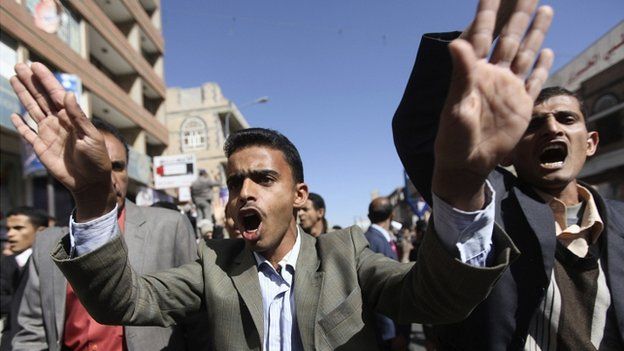Yemen crisis: Thousands march against rebels in Sanaa
- Published

Thousands of Yemenis have taken to the streets in the capital Sanaa to protest against Shia Houthi rebels who have tightened their grip on the city.
Friday saw marches for and against the rebels, in the wake of the resignation of the Western-backed president and PM.
President Abdrabbuh Mansour Hadi had said he could not continue after the Houthis failed to honour a peace deal.
Protests against the rebels were also reported in a number of other cities on Saturday.
Parliament is due to meet on Sunday to discuss whether to accept President Hadi's resignation.
BBC Arabic's Issam Ikirmawi: "Things have got completely out of control with the Houthi overrunning Sanaa, the capital"
Security sources have told the BBC that Yemen's intelligence chief, Ali Hassan al-Ahmedi, has also stepped down.
BBC regional analyst Alan Johnston says that in the aftermath of President Hadi's resignation there's a sense that Yemen is leaderless and drifting through a dangerously uncertain political moment.
Ceasefire shattered
Demonstrators chanted "No to Houthis" as they headed towards President Hadi's home.
They demanded that he stay in power and impose the authority of the state despite the pressure from the rebels.
Houthi militiamen did not attempt to stop them.
Some reports said up to 10,000 people were taking part.
On Wednesday the president's home was shelled, shattering a ceasefire that had been agreed only hours earlier.
The ceasefire deal had met a series of rebel demands, including the expansion of Houthi representation in parliament and key state institutions.
In return, the rebels said they would pull back from their positions and free the president's chief-of-staff, who they have held for a week. But so far they have not done so.
Houthi gunmen also fired on Prime Minister Khaled Bahah's convoy earlier in the week and then laid siege to the palace where he was staying.
The Houthis, who follow a branch of Shia Islam known as Zaidism, have staged periodic uprisings since 2004 in an effort to win greater autonomy for their northern heartland of Saada province.
Since July the rebels have inflicted defeats on tribal and militia groups backed by the leading Sunni Islamist party, Islah, and battled al-Qaeda as they have pushed into central and western provinces.
- Published22 January 2015
- Published22 January 2015
- Published14 April 2023
- Published13 February